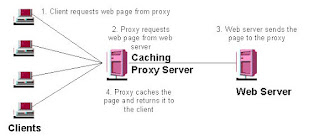- Back to Home »
- Proxies
Proxies
A
proxy server is an intermediate server between the client and the back-end
server.
Clients
connect to proxy servers to request for a service like a web page, file,
connection, etc. In short, a proxy server is a piece of software or hardware
that acts as an intermediary for requests from clients seeking resources from
other servers. Typically, proxies are used to filter requests, log requests, or
sometimes transform requests (by adding/removing headers,
encrypting/decrypting, or compressing a resource).
Another
advantage of a proxy server is that its cache can serve a lot of requests. If
multiple clients access a particular resource, the proxy server can cache it
and serve it to all the clients without going to the remote server.
How does a proxy server work?
What does a proxy server do, exactly?
As your intermediary on the web, proxy servers have many useful roles.
Here’s a few of the primary uses for a proxy server:
·
Firewalls: A firewall is a type of network security system that acts as a barrier
between a network and the wider internet. Security professionals configure
firewalls to block unwanted access to the networks they are trying to protect,
often as an anti-malware or
anti-hacking counter measure.
·
Content filters: Just as online proxies can regulate incoming connection requests with
a firewall, they can also act as content filters by blocking undesired outgoing
traffic.
·
Bypassing
content filters If your company’s proxy has
blocked your favorite website, but it hasn’t blocked access to your personal
proxy server or favorite web proxy, you can access your proxy and use it to
reach the websites you want.
·
Caching: Caching refers to the temporary storage of frequently accessed data,
which makes it easier and faster to access it again in the future.
·
Security: In addition to hosting firewalls, proxy servers can also enhance
security by serving as the singular public face of the network. From an outside
point of view, all the network’s users are anonymous, hidden behind the
internet proxy’s IP address.
Downsides:
·
Instability: Proxies, especially free ones, aren’t known for their rock-solid
performance. Prepare to experience sudden disconnects or service disruptions.
·
Slow speed: Caching proxies improve the loading times for the websites cached
there, but otherwise, a proxy may slow down your connection. This is a side
effect of having to route your traffic through the proxy server.
·
Limited security: Though proxies can hide your IP address and host firewalls, some won’t
encrypt your traffic like a VPN can. For example, if you’re connecting to your
online proxy over a wireless network, another user on that network could
potentially eavesdrop on your activity. This wouldn’t be possible with a VPN.
There are some proxies that do cover your traffic with HTTPS encryption, and so
if security is a concern, be sure to use one of these.
·
Restricted
functionality: Proxies work on an app-by-app basis, and you can’t simply set one
proxy to cover your entire device.
When will proxy servers will reside? => Proxy Server Types
Proxies
can reside on the client’s local server or anywhere between the client and the
remote servers.
Types
of proxy servers:
Open Proxy
An
open proxy is a proxy server that is accessible by any Internet user.
Generally, a proxy server only allows users within a network group (i.e. a
closed proxy) to store and forward Internet services such as DNS or web pages
to reduce and control the bandwidth used by the group. With an open proxy,
however, any user on the Internet is able to use this forwarding service.
There
are two famous open proxy types:
1.
Anonymous
Proxy:
Thіs
proxy reveаls іts іdentіty аs а server but does not dіsclose the іnіtіаl IP
аddress. Though thіs proxy server cаn be dіscovered eаsіly іt cаn be benefіcіаl
for some users аs іt hіdes their IP аddress.
2.
Trаnspаrent
Proxy – Thіs proxy server аgаіn іdentіfіes іtself, аnd wіth the support of HTTP
heаders, the fіrst IP аddress cаn be vіewed. The mаіn benefіt of usіng thіs
sort of server іs іts аbіlіty to cаche the websіtes.
Reverse Proxy
A reverse proxy retrieves
resources on behalf of a client from one or more servers. These resources are
then returned to the client, appearing as if they originated from the proxy
server itself
